Feedback control of AHR signalling regulates intestinal immunity
- PMID: 28146477
- PMCID: PMC5302159
- DOI: 10.1038/nature21080
Feedback control of AHR signalling regulates intestinal immunity
Abstract
The aryl hydrocarbon receptor (AHR) recognizes xenobiotics as well as natural compounds such as tryptophan metabolites, dietary components and microbiota-derived factors, and it is important for maintenance of homeostasis at mucosal surfaces. AHR activation induces cytochrome P4501 (CYP1) enzymes, which oxygenate AHR ligands, leading to their metabolic clearance and detoxification. Thus, CYP1 enzymes have an important feedback role that curtails the duration of AHR signalling, but it remains unclear whether they also regulate AHR ligand availability in vivo. Here we show that dysregulated expression of Cyp1a1 in mice depletes the reservoir of natural AHR ligands, generating a quasi AHR-deficient state. Constitutive expression of Cyp1a1 throughout the body or restricted specifically to intestinal epithelial cells resulted in loss of AHR-dependent type 3 innate lymphoid cells and T helper 17 cells and increased susceptibility to enteric infection. The deleterious effects of excessive AHR ligand degradation on intestinal immune functions could be counter-balanced by increasing the intake of AHR ligands in the diet. Thus, our data indicate that intestinal epithelial cells serve as gatekeepers for the supply of AHR ligands to the host and emphasize the importance of feedback control in modulating AHR pathway activation.
Conflict of interest statement
Author information: The authors declare no competing financial interests.
Figures
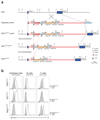
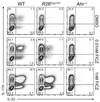

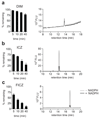


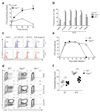


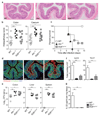
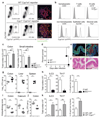

Comment in
-
Mucosal immunology: Rationing AHR ligands.Nat Rev Immunol. 2017 Mar;17(3):146-147. doi: 10.1038/nri.2017.8. Epub 2017 Feb 13. Nat Rev Immunol. 2017. PMID: 28192416 No abstract available.
References
-
- Denison MS, Nagy SR. Activation of the aryl hydrocarbon receptor by structurally diverse exogenous and endogenous chemicals. Annual review of pharmacology and toxicology. 2003;43:309–334. - PubMed
-
- Zelante T, et al. Tryptophan catabolites from microbiota engage aryl hydrocarbon receptor and balance mucosal reactivity via interleukin-22. Immunity. 2013;39:372–385. - PubMed
-
- McMillan BJ, Bradfield CA. The aryl hydrocarbon receptor sans xenobiotics: endogenous function in genetic model systems. Mol Pharmacol. 2007;72:487–498. - PubMed
-
- Moura-Alves P, et al. AhR sensing of bacterial pigments regulates antibacterial defence. Nature. 2014;512:387–392. - PubMed
-
- Schmidt JV, Bradfield CA. Ah receptor signaling pathways. Annual review of cell and developmental biology. 1996;12:55–89. - PubMed
Publication types
MeSH terms
Substances
Grants and funding
LinkOut - more resources
Full Text Sources
Other Literature Sources
Molecular Biology Databases
Research Materials

